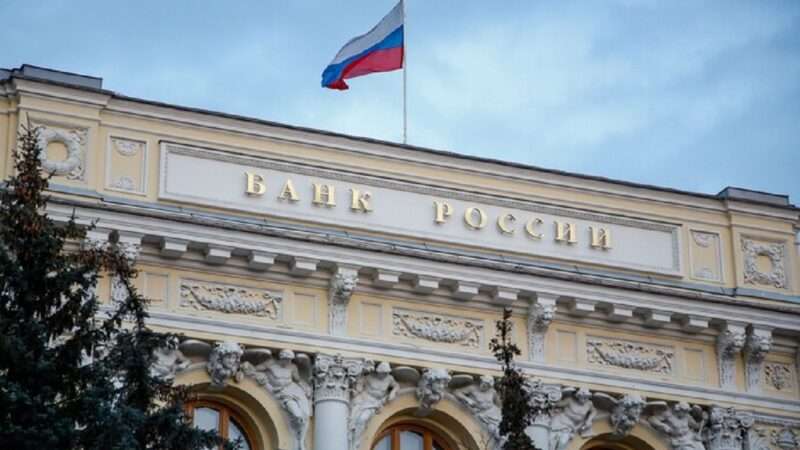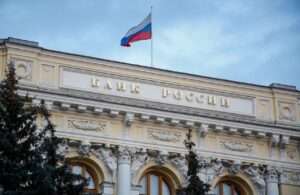

There is an ongoing political debate about the appropriate extent of Western aid to Ukraine in resisting Russian aggression. How much cost is it worthwhile for Western taxpayers to bear? Whatever, the answer, the burden can be greatly reduced by confiscating Russian government assets in the West, and using them to fund Ukraine's defense.
There is a staggering $300 billion in frozen Russian state assets located in Western nations backing Ukraine. Most of this wealth is located in European Union nations. But about $5 billion is in the US. To put this figure in perspective, it's worth noting that the total amount of US aid to Ukraine from February 2022 through July 31, 2023 was about $77 billion. The European Union, individual European states, and Canada, gave approximately $165 billion during the same period (I converted Euro figures to dollars at the current exchange rate). The $300 billion in frozen assets is equal to some two years of total Western assistance to Ukraine at the current pace of spending!
There is a strong moral and pragmatic case for seizing Russian state assets and using them to fund Ukraine's defense. Michael McFaul, a leading expert on Russian politics and foreign policy, summarizes some key points in a recent Washington Post article:
Since the war began, a broad coalition of countries has joined together to confiscate billions in Russian assets. Some of these assets belong to oligarchs who have propped up Putin's system; by far the largest amount, though, is sitting in frozen accounts held by the Russian Central Bank. These funds amount to some $300 billion, of which the largest share has been seized by the Europeans. These funds should be deployed as soon as possible to help bring the war to an end and finance Ukraine's reconstruction. Considering that Russia's unprovoked war has inflicted hundreds of billions of dollars of damage on the Ukrainian economy, it's only just that the international community should impose some of these costs on the Russian state itself….
[S]ome experts worry that transfer of these funds will set a negative precedent for global financial institutions. I disagree. Seizing assets of the Russian state after Putin invaded and annexed Ukraine sets a positive, deterrent precedent to other world leaders thinking about using military force to annex territory. And we should not want criminals to do their banking in the democratic world.
A recent Renew Democracy Initiative analysis by a team of lawyers led by Harvard law Prof. Laurence Tribe does a thorough job of addressing a variety of possible legal objections to such a step. But scholars such as Lee Buchheit and Paul Stephan, and Yale Law School Prof. Oona Hathaway have raised a variety of objections and reservations.
I won't try to go over all the law and policy issues here, and some are outside my areas of expertise. But I will cover some points that are within my competence, most notably those relating to property rights.
The most obvious moral objection is that the property in question ultimately belongs to the Russian people, and cannot legitimately be taken away from them by foreign powers. While the Putin regime is to blame for the war and resulting atrocities, most ordinary Russians are not. This objection might carry some weight if it were at all likely that Putin's government would use this property for purposes that benefit the Russian people. But given the nature of his authoritarian state, that is highly unlikely. If the present Russian government regains control of these assets, it is more likely to use them to further oppress Russians and Ukrainians like.
Using the assets to help Ukraine defeat Russia increases the likelihood of regime change in the latter state, or at least of some degree of liberalization. And that is the best hope for a Russian government that actually serves the interests of its people, or is at least less awful than the present regime. For that reason, we should not be deterred by fear of unjustly harming ordinary Russians. To the contrary, using Russian state assets to help Ukraine defeat Putin might actually benefit them.
There are also slippery slope objections to consider. If Western nations confiscate Russian state assets today, might they not confiscate other foreign property tomorrow, perhaps with far less justification? The answer to this objection is that legislation authorizing confiscation should be narrowly focused on Russian property, and possibly that of other states waging unjust wars of aggression and committing enormous human rights violations.
In addition, in the US the private property of foreigners is protected against confiscation by the Takings Clause of the Fifth Amendment, which requires the government to pay "just compensation" if it takes "private property." Most European nations have similar constitutional protections for private property rights, as does the European Convention on Human Rights.
But the Fifth Amendment and its European analogues do not offer the same kind of blanket protection to the property of foreign governments. This distinction undermines claims by some critics that uncompensated seizure of Russian state assets would violate the Takings Clause and similar constitutional guarantees in Europe. It also mitigates concerns that confiscating Russian government assets would create a dangerous slippery slope. Private property rights of foreigners would remain protected by constitutional guarantees.
There could still be a slippery slope with respect to property owned by foreign governments. But that is mitigated by the strong incentives governments have to maintain good relations with allies and trading partners. It's unlikely that Western nations will start systematically confiscating foreign states' assets outside of extreme cases like that posed by Russia's horrific assault on Ukraine. To the extent that confiscation of Russian assets leads other authoritarian rulers to think twice about imitating Putin's actions, or prevents them from investing in the West, slippery slope possibilities might even be a feature, rather than a bug.
What is true of property rights protections is also true of the Due Process Clause of the Fifth Amendment, and other similar procedural guarantees against seizure of property. The Due Process Clause and other such provisions are meant to protect private individuals and organizations against deprivation of life, liberty, and property without due process. They don't offer comparable protection to foreign governments. Indeed, it would be perverse to use laws intended to protect individuals against arbitrary state oppression to instead protect a mass-murdering oppressive state from having its assets seized for the purposes of using them to resist its aggression and massive human rights violations.
Oona Hathaway argues that confiscating Russian state assets would violate sovereign immunity. I think the Tribe report offers compelling responses to this argument (pp 60-64).
In addition, I am not convinced that sovereign immunity is actually a just principle that we have a duty to obey. It is in fact a perversion of justice, enabling rulers to escape accountability for violating human rights and other injustices they perpetrate. It was a mistake to read it into the US Constitution. It is equally a mistake to allow it to be a principle of international law. Some laws are so deeply unjust that we have no duty to obey them. The law of sovereign immunity is one such case.
At the very least, sovereign immunity should not be permitted to shield authoritarian states like Putin's regime from having their assets confiscated in order to combat their wars of aggression, mass murder of civilians, and other large-scale human rights violations. Such rulers no more deserve sovereign immunity than Mafia bosses. Indeed, they are far worse than Mafia bosses.
If necessary, the US and European nations should enact legislation stripping the Russian state of all sovereign immunity. Any possible violation of international law here is well-justified.
There is a pragmatic concern that, absent sovereign immunity, authoritarian rulers will confiscate the property of Western governments. But authoritarian states have vastly more assets invested in the West than vice versa. Moreover, many of them have strong incentives to stay on the good side of the US and its allies. Confiscating Russian assets might even strengthen those incentives. They might think twice about imitating Russian actions if doing so leads to the confiscation of assets they have stashed in the West.
The above analysis assumes that Ukrainian resistance to Russia is a just cause worth supporting. If not, there is no reason to assist it. I won't go through all the moral and pragmatic reasons why supporting Ukraine is the right thing to do. But I have previously covered many of them here, here, and here.
I also won't respond in detail to those who argue the West should force Ukraine to make peace. I will merely point out that such a step would embolden further aggression by Putin and other authoritarians, and consign hundreds of thousands of Ukrainians to horrific occupation. Anne Applebaum makes many additional relevant points in a recent Atlantic article critiquing the case for giving up on Ukraine.
The post Fund Ukraine's War Effort by Confiscating Russian Government Assets appeared first on Reason.com.







